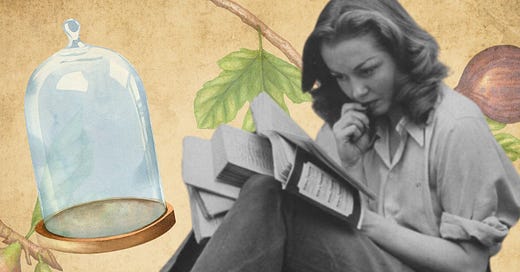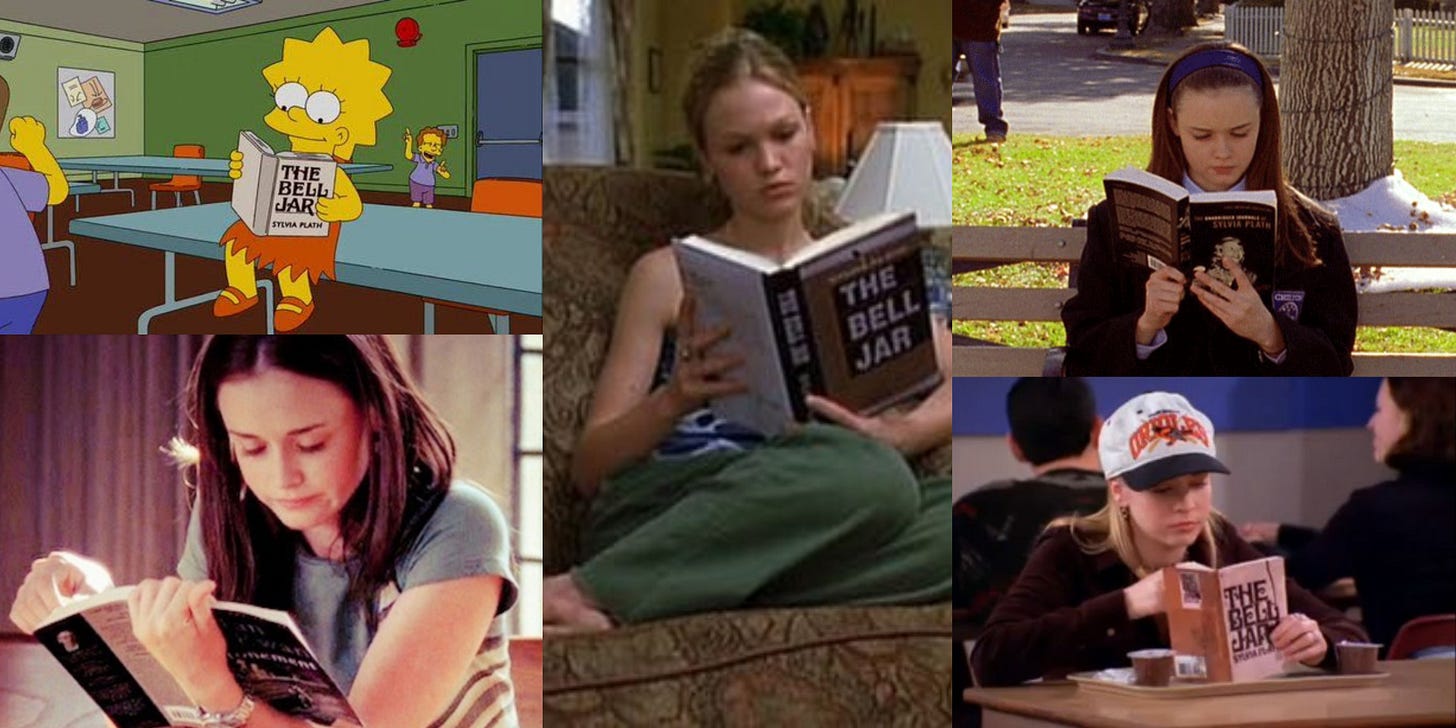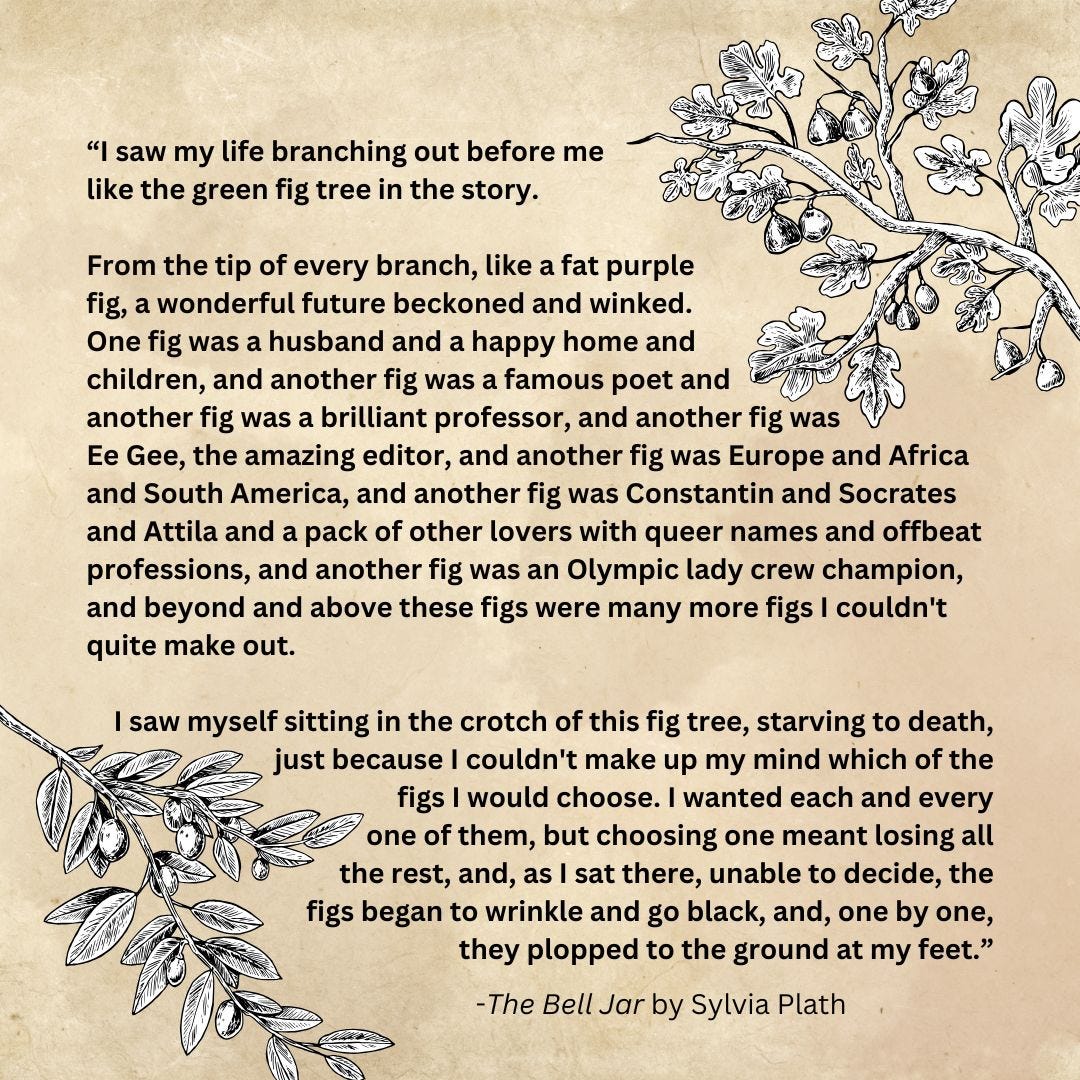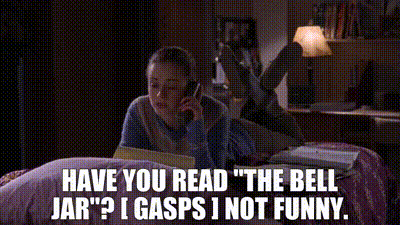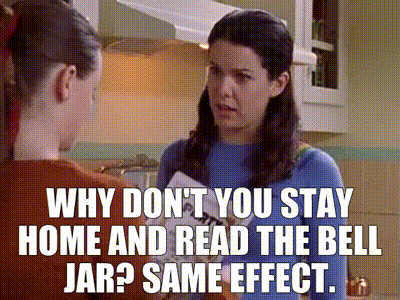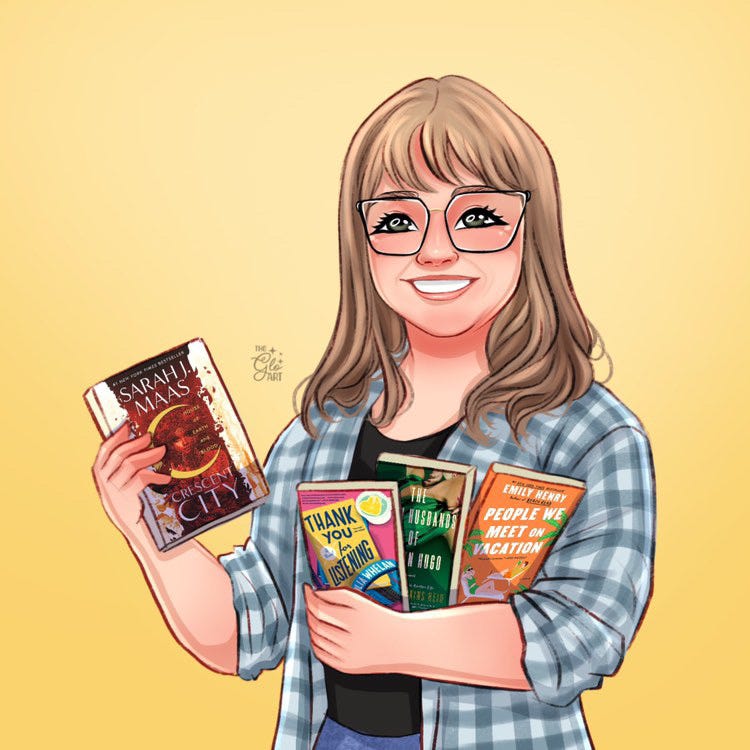There comes a time in every American Girl’s® life when she feels seen by the decades-old words of a mentally unstable poet. And now, my dear readers, it is my turn. I didn’t just read Sylvia Plath’s The Bell Jar, I felt seen by every paragraph.
Each chapter drove home the fact that I’ve never had an original thought in my life. When I shared this (currently trending on social media) sentiment with my yiayia, she kindly reminded me, “very few people do.” 😑
At the end of the day, my biggest takeaway was that the experience of girlhood is timeless. Yes Esther, the protagonist, and I share many demographics (white, east coast American, Unitarian, overachieving students raised in an educated family somewhere between middle-class and wealthy), but her experiences and personality resonated in the most delightfully unexpected ways.
Listening to this audiobook (marvelously narrated by Maggie Gyllenhaal) was a reminder that society’s expectations for women may have evolved in the last 70 years, but they haven’t really changed. The Bell Jar is a coming-of-age story turned descent into madness.
It is an honest and inevitable result of raising a girl to believe the sky’s the limit and then telling her she’ll only be able to see said sky through a window because she’ll be busy raising her children and husband inside his house.
Girls and women like Esther were driven to institutionalization when really society as a whole was (and is) crazy for expecting people born with two x chromosomes to magically lose all passion and ambition once they reach the age of consent.
The fig tree metaphor receives a lot of attention, rightfully so, but there was a line just before that beautiful paragraph that caught my attention.
“...I felt dreadfully inadequate. The trouble was, I had been inadequate all along, I simply hadn’t thought about it. The one thing I was good at was winning scholarships and prizes, and that era was coming to an end. I felt like a racehorse in a world without racetracks”
-The Bell Jar by Sylvia Plath
My final year in college and the first year out of school was the most depressing chapter of my life. I remember coming out of that daunting season and opening up to some of my elders about the experience. I was floored to hear that each and every one of them shared the sentiment and had experienced parallel if not identical experiences at their finale of adolescence.
Why are we not talking about this???
Maybe it’s a crucial part of development, this solitary confinement in our individual bell jars contemplating the rest of our lives, but I have to think it would alleviate the pressure to know that what we are experiencing is not unique. It is in fact is a canon event in growing up. (Much like reading and loving the works of Sylvia Plath.)
A difference between my aimless departure from adolescence and Esther’s, is that while I was a ribbon-winning horse all-of-the-sudden sans guardrails, she still had a path laid out ahead of her, just an undesirable one. Her predicament was more akin to having her blinders taken off. How is she expected to continue down this romanticized track of womanhood when she knows full well there’s another track out there for a future filled with writing? And another that will take her abroad? But she’s expected to continue enthusiastically around this bend to marry the nice med student who disgusts her?
Queue menty-B!
I remember once in my early twenties seeing Michelle Obama being interviewed on some news network and saying something along the lines of how girls don’t understand the extent of misogyny and patriarchy in today's world until they enter the workforce. (I cannot find evidence of this clip for the life of me.) Our education system has made so much progress in recent decades that girls and women thrive in and often dominate academia (especially K-12). While I agree with this sentiment as far as women and girls are nurtured and protected in academia (to an extent because let’s be so for real) I think this awareness is compounded by an increasing awareness of the bullshit (not for lack of a better word) that we are socialized to accept and excuse. It’s in these transition years, that our blinders come off.
Sylvia Esther was born without blinders. Her awareness of every detail is what makes this book so relevant nearly a century later.

When pressured [by her mother] to learn shorthand for job security, “Everybody would want her. She would be in demand among all the up-and-coming young men and she would transcribe letter after thrilling letter.” Esther had the best reaction, “The trouble was, I hated the idea of serving men in any way. I wanted to dictate my own thrilling letters.”
“The trouble was, I hated the idea of serving men in any way. I wanted to dictate my own thrilling letters.”
-The Bell Jar by Sylvia Plath
Boy do I miss the days when I thought “May you have the confidence of a mediocre white man” were just funny words to put on a tote bag. I doubt Sylvia Plath ever had such illusions.
To educate a woman is to water her fig tree. Whether she’s a racehorse at a fork in the road or a young woman crouching below a fig tree, the options are there for her to choose and the indecisiveness is paralyzing.
Long story short, brace yourself for more content on The Bell Jar and Sylvia Plath’s works and life in general, because this book found me at the right time. I’ve already pulled 17 pages worth of Taylor Swift lyrics that tie into this book. And I immediately started listening to Britney Spears’s memoir The Woman in Me and the parallels of feminine ennui feel significant and I can’t believe fate brought them to my earbuds back-to-back, in women’s history month!
Have you read The Bell Jar?
I want to know all your thoughts! I’ve been finding every excuse to work The Bell Jar into conversation, so please hit me up!
Hyper-fixation du jour: Sylvia Plath
Obviously…
If you want to purchase any of the books mentioned in this article, please consider using my affiliate link with my favorite independent book store, The Ripped Bodice, or using my referral link to libro.fm for an audiobook!


